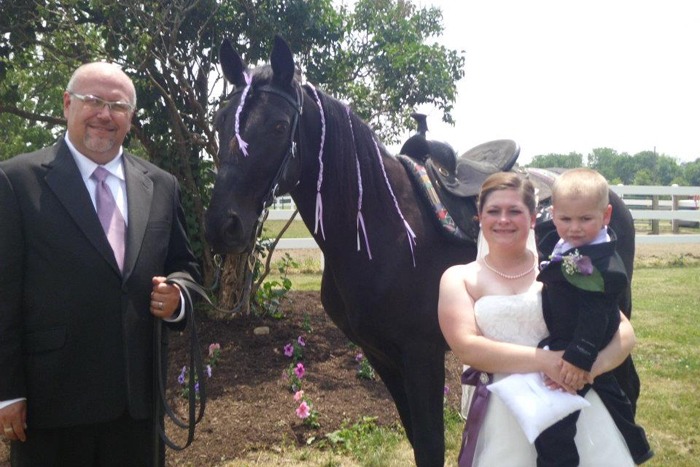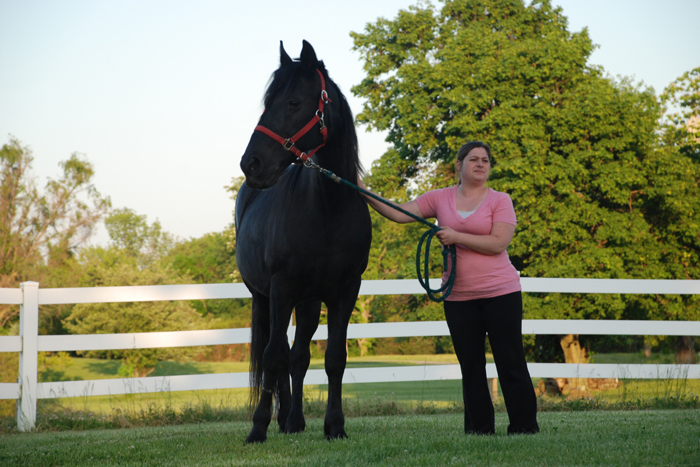My Horse's Death and the Life of a 'Tennessee Walker' (Op-Ed)


Corrin Zumwalt is a horse owner and advocate for Tennessee walking horses who lives in Somerville, Ohio. She shares the personal story of her horse, Major, with the hope that federal lawmakers will approve pending legislation to protect the breed. She contributed this article to Live Science's Expert Voices: Op-Ed & Insights.
Several months ago, I lost my best friend. It didn't matter that he was a horse and I was a human — we spent the past five years rarely leaving each other's company.
My days revolved around Major, and the lessons we learned from each other. My time with him during riding and training sessions was precious, and he even shared in some of my most momentous life events. I didn't walk down the aisle at my wedding, for example — I rode down the aisle on Major's back.
To be sure, I am devastated by his death. But I know his story can make a difference in the lives of other horses and their owners.
I had known since first bringing him home that his past was far from idyllic. He was fearful when anyone entered his stall, and would pace and rear if anyone tried to lead him out. It was clear that he had not received the kind of love and care earlier as he was getting from me. It broke my heart into a million pieces when I learned the details of his past: Major once had been a "big lick" horse, a Tennessee walker, ridden around a show ring in tall, heavy shoes, and with chains around his ankles.
He almost certainly spent his entire show career in constant agony. In order to perform the classic "big lick" gait, horses are abused through a practice known as soring. Major's trainers would have dabbed mustard oil, kerosene or other caustic chemicals on his pasterns (the sloping parts of a horse's foot between the hoof and fetlock) and legs, creating sensitized flesh where the chains would strike. The ensuing pain would cause him to fling his feet off of the ground to create the characteristic big lick.
His trainers also would have forced him to stand on hard blocks or bolts to bruise the tender parts of his feet so he'd step even higher. If they found him lying in his stall to get some relief from his sore feet, they would have beaten him to force him to stand again.
Get the world’s most fascinating discoveries delivered straight to your inbox.
Major's veterinarian believes that soring shortened my friend's life. Major learned to trust me, but he couldn't overcome the damage wrought upon his body by his abusive early life.
Soon after a bad episode of colic, he developed asthma and chronic obstructive pulmonary disease, followed by an abscessed and malformed hoof. We treated his problems as they arose, but we could not safely treat both simultaneously. Last November, Major and I spent the last hour of his life together.
My sorrow is immeasurable, and I miss him every day. So I now feel compelled to speak out in support of legislation that would prevent this unspeakable abuse from happening to other horses — the Prevent All Soring Tactics (PAST) Act. This is the only bill before the U.S. Congress that can put an end to these barbaric and inhumane practices.
More than 40 years ago, Congress tried to crack down on soring with the Horse Protection Act of 1970, but the corrupt self-policing system put into place has allowed the problem to fester. The current measure, PAST Act, H.R. 1518/S. 1406, will ban the unnaturally tall shoes and chains used to exacerbate the blistering chemicals, will end the failed self-regulation in the industry, and will strengthen penalties for anyone caught torturing their horses for the sake of a high-step. [Step-by-Step Progress Protecting Tennessee Walking Horses (Op-Ed)]
Major would have been better able to fight his ailments if he hadn't been forced to endure the torture of soring during his career as a big lick horse. No horses — nor the humans who love them — should have to go through what we went through.
Major's loss should mean something. Please take what happened to him and translate it into lasting change. Tell your lawmakers in the U.S. Senate and the U.S. House of Representatives to speedily approve the PAST Act — both to honor my best friend, as well as to save all the Majors of the future.
Follow all of the Expert Voices issues and debates — and become part of the discussion — on Facebook, Twitter and Google +. The views expressed are those of the author and do not necessarily reflect the views of the publisher. This version of the article was originally published on Live Science.




